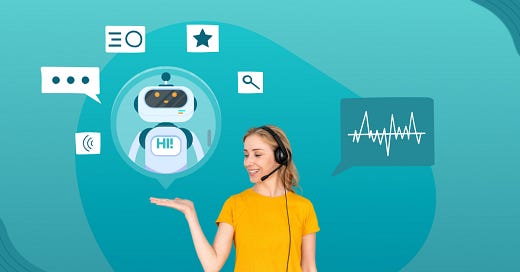Last week, Sequoia partner Konstantine Buhler said in a piece that in the next 5-7 years, AI will reshape and accelerate our economy by enabling “always-on” operations across numerous sectors.
Take the Medical professionals and Customer support industries for example:
Medical professionals will benefit from AI-powered documentation systems that operate continuously. Consider emergency surgeons responding to 3 AM calls—AI will automatically document these urgent communications, allowing doctors to focus entirely on patient care and superior outcomes rather than administrative tasks. AI note-takers like Freed and Abridge are transforming healthcare by eliminating documentation burdens. And always-on information systems like OpenEvidence help doctors keep up with the latest treatments instantaneously.
The days of “high call volume” messages and limited business hours are numbered. AI will handle front-line support continuously, with human managers available for escalations. Small businesses will compete with large corporations in providing 24/7 customer care, using AI to filter and escalate only truly urgent matters.
Freed AI hit $20M ARR to revolutionize Medical Documentation
Freed AI, an AI-powered medical scribing tool, exemplifies this shift. Co-founded by Erez Druk, Freed has achieved an Annual Recurring Revenue (ARR) exceeding $20 million within just 2 years, said Erez Druk.
To me, Freed addresses a significant pain point for clinicians by automating the transcription and organization of patient-doctor conversations into medical notes. This solution has rapidly gained traction, leading to a $30 million Series A funding round led by Sequoia Capital.
Druk reflects on the entrepreneurial journey, noting that while starting a company is easier than ever, achieving success remains challenging:
It's easier than ever to start a startup, but not any easier to succeed. More people than ever are starting. Your idea can be copied in a weekend. Products become chatgpt features on every release. Easier to start is not easier to finish.
Forgot to share that Freed is a $20m arr startup now. I used to think that $1m startups must have their act together. Then I thought maybe things start making sense at $10m. Now I assume it's complete chaos all the way through.
However, the competitive landscape is intense, there are about 100 competitors to Freed. To address customer retention, they built a cool churn prediction model.
Building $90M ARR in 15 months to revolutionize the CX business
In the customer service sector, the competitive landscape is similar to medical scribing. There are already many unicorn startups, such as:
1. Sierra (now valued at $4.5B), co-founded by OpenAI’s chairman Bret Taylor.
2. Cresta (now valued at $1.6+B), co-founded by OpenAI alumni Tim Shi.
3. Decagon (nabed $100M fundraising), co-founded by Jesse Zhang.
But the demand is vast, characterized by high call volumes, reliance on human agents, and long wait times. With the help of AI, it will handle front-line support continuously, with human managers available for escalations. Small businesses will compete with large corporations in providing 24/7 customer care, using AI to filter and escalate only truly urgent matters.
Then the VC/PE firm General Catalyst hatched a company to revolutionize the contact center business. Within just 15 months, it raised a total of $50 million and achieved profitability with an ARR reportedly exceeding $90 million.
Its core offering is an AI-powered customer support platform that combines a chatbot with a managed team of human agents. The AI “CX Assistant” is built on large language models and can be trained on a customer’s internal data (product catalogs, FAQs, etc.) to answer common questions autonomously.
For example, an online retailer can supply it with product and order data so the chatbot handles product inquiries or shipping status questions. Its core differentiator is the combination of AI and service.




